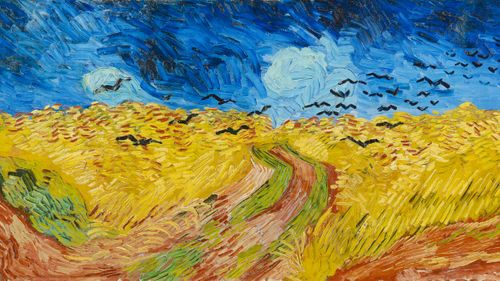'Wheatfield with Crows': The Dark Secrets Behind Van Gogh's Final Masterpiece
Mar 07, 2024 · 2 mins read
0
Share

Van Gogh's "Wheatfield with Crows" is often thought of as his final, foreboding masterpiece, a canvas swirling with emotion and the artist's turbulent psyche. Let me explain why...
Save
Share
The painting's tumultuous sky, a riot of blues and blacks, clashes with the golden wheat below, a visual metaphor for the strife between despair and vitality.
Save
Share
Crows, traditionally symbols of bad omens, take flight in the painting, their dark forms cutting through the sky, adding to the work's sense of unrest and foreboding.
Save
Share
This piece is a masterful display of Van Gogh's signature impasto technique, where thick, textured strokes of paint bring a dynamic, almost three-dimensional quality to the fields.
Save
Share
Some interpret the three separate paths as a crossroads, reflecting Van Gogh's own uncertain future and the choices that lay before him in his final days.
Save
Share
Despite its somber reputation, the vibrant yellows and intense blues showcase Van Gogh's unparalleled ability to capture the vivacity of the natural world.
Save
Share
"Wheatfield with Crows" was created in Auvers-sur-Oise, France, where Van Gogh spent the last few months of his life, and where he produced a prolific number of artworks.
Save
Share
The painting's composition, with the crows leading the viewer's eye into the tumultuous sky, evokes a sense of movement and an almost palpable energy.
Save
Share
While often linked to Van Gogh's death, the painting's exact place in his final works is uncertain, adding to its mystique and the debates surrounding its interpretation.
Save
Share
"Wheatfield with Crows" remains a powerful testament to Van Gogh's emotional landscape and artistic genius, inviting viewers to ponder the beauty and complexity of his troubled mind.
Save
Share
0